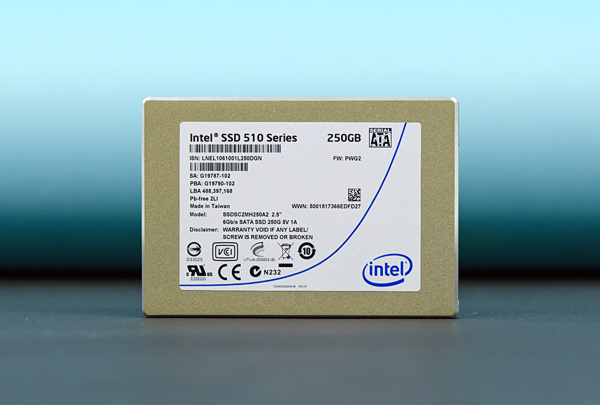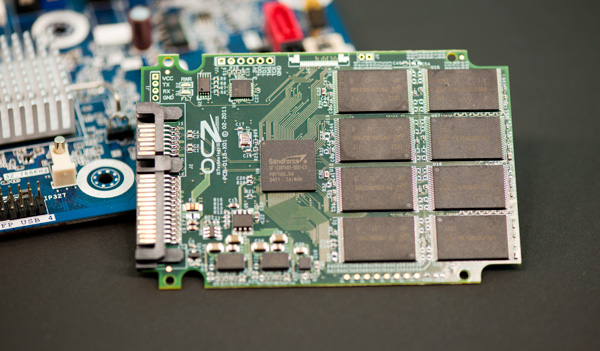The MacBook Pro Review (13 & 15-inch): 2011 Brings Sandy Bridge
by Anand Lal Shimpi, Brian Klug & Vivek Gowri on March 10, 2011 4:17 PM EST- Posted in
- Laptops
- Mac
- Apple
- Intel
- MacBook Pro
- Sandy Bridge
6Gbps Performance
I installed the Intel SSD 510 in a 15-inch 2011 MacBook Pro as well as a 15-inch 2010 MacBook Pro to put together a 3Gbps vs. 6Gbps performance comparison. I turned to Xbench for some quick and dirty performance data:
| SATA Performance—XBench 1.3 | |||||
| Intel SSD 510 250GB | 3Gbps (2010 15-inch MBP) | 6Gbps (2011 15-inch MBP) | 6Gbps Advantage | ||
| 4KB Sequential Write | 157.8 MB/s | 192.2 MB/s | +21.8% | ||
| 256KB Sequential Write | 182.0 MB/s | 257.1 MB/s | +41.3% | ||
| 4KB Sequential Read | 32.5 MB/s | 32.7 MB/s | 0.0% | ||
| 256KB Sequential Read | 197.3 MB/s | 315.6 MB/s | +60.0% | ||
| 4KB Random Write | 47.8 MB/s | 49.0 MB/s | +2.5% | ||
| 256KB Random Write | 186.4 MB/s | 260.9 MB/s | +40.0% | ||
| 4KB Random Read | 14.5 MB/s | 13.4 MB/s | -7.6% | ||
| 256KB Random Read | 149.7 MB/s | 207.3 MB/s | +38.5% | ||
As you'd expect, there's no real benefit to the new 6Gbps interface for random operations (particularly at low queue depths). Sequential speeds are much improved however. Xbench shows up to a 60% increase in performance in sequential operations.
You'll note that the absolute numbers are pretty low to begin with. A 128KB sequential read of the Intel SSD 510 on our desktop Sandy Bridge SSD testbed pulls nearly 400MB/s. On the new MacBook Pro we can't get more than 320MB/s.
Our sequential Iometer tests are run at a queue depth of 1 so there's no advantage there. The only explanation I can come up with (assuming Xbench's test is accurate) is that Apple may be aggressively implementing SATA controller power management under OS X. Capping the link's performance or aggressively putting it to sleep could reduce performance at the benefit of increasing battery life.
The other thing I noticed was that performance on the 13-inch MBP using Xbench was a bit lower than the 15-inch MBP. Take a look at these numbers:
| SATA Performance—XBench 1.3 | |||||
| Intel SSD 510 250GB | 13-inch 2011 MBP | 15-inch 2011 MBP | |||
| 4KB Sequential Write | 155.3 MB/s | 192.2 MB/s | |||
| 256KB Sequential Write | 184.8 MB/s | 257.1 MB/s | |||
| 4KB Sequential Read | 30.4 MB/s | 32.7 MB/s | |||
| 256KB Sequential Read | 201.8 MB/s | 315.6 MB/s | |||
| 4KB Random Write | 49.6 MB/s | 49.0 MB/s | |||
| 256KB Random Write | 183.9 MB/s | 260.9 MB/s | |||
| 4KB Random Read | 13.9 MB/s | 13.4 MB/s | |||
| 256KB Random Read | 144.9 MB/s | 207.3 MB/s | |||
I only noticed this with the Intel SSD 510, the Crucial RealSSD C300 and Vertex 3 both performed identically between the 13 and 15-inch MBPs. I'm not sure what's going on here at all, although I suspect that it's somehow related to the issues users have been having with some of these drives (more on this below).
SSD Recommendations
Where does all of this discussion about SSDs leave us? Unfortunately recommending an SSD for the new MacBook Pro today is pretty difficult but I'll try my best.
If you're the conservative type and just wants something that for sure works with little to no concern about absolute performance, the Apple SSDs are probably the safest bet. You'll get a drive that's much faster than a hard drive, fully supported by Apple and with TRIM support. Yes, that's right, OS X finally has TRIM support but Apple only enables it on it's own branded SSDs. To Apple's credit, given the number of problems I've seen with SSDs over the past couple of years it makes sense to lock down and only support drives you've validated. On the flip side however, Apple should be validating and working with controller makers to ensure all drives work under OS X. Making as much money as Apple does, I don't buy the "we didn't have the time/resources" argument.
If you are going down the Apple SSD path, at least the 128GB drive isn't super ridiculously priced, although I'm less comfortable recommending the 256GB version unless you can get it at $500.
Now if you want to get a faster SSD or actually take advantage of the 6Gbps interface, things get more complicated. I've heard reports of users having issues with the Intel SSD 510 and Crucial RealSSD C300. I've tested both drives as well as the OCZ Vertex 3 in three different MacBook Pros, and in all cases the drives worked perfectly. They were all detected as 6Gbps drives and all performed well. I should note that while I couldn't get the Vertex 3 Pro to work in the 2010 MacBook Pro, the Vertex 3 worked just fine in the 2011 MacBook Pro.
| SATA Performance—XBench 1.3 | ||||||
| 13-inch 2011 MBP | Crucial C300 256GB | Intel SSD 510 250GB | OCZ Vertex 3 240GB | |||
| 4KB Sequential Write | 239.0 MB/s | 155.3 MB/s | 319.9 MB/s | |||
| 256KB Sequential Write | 217.2 MB/s | 184.8 MB/s | 257.8 MB/s | |||
| 4KB Sequential Read | 35.1 MB/s | 30.4 MB/s | 33.3 MB/s | |||
| 256KB Sequential Read | 248.3 MB/s | 201.8 MB/s | 311.8 MB/s | |||
| 4KB Random Write | 175.0 MB/s | 49.6 MB/s | 247.8 MB/s | |||
| 256KB Random Write | 226.6 MB/s | 183.9 MB/s | 290.0 MB/s | |||
| 4KB Random Read | 19.1 MB/s | 13.9 MB/s | 21.1 MB/s | |||
| 256KB Random Read | 239.0 MB/s | 144.9 MB/s | 304.0 MB/s | |||
| SATA Performance—XBench 1.3 | ||||||
| 15-inch 2011 MBP | Crucial C300 256GB | Intel SSD 510 250GB | OCZ Vertex 3 240GB | |||
| 4KB Sequential Write | 239.3 MB/s | 192.2 MB/s | 316.5 MB/s | |||
| 256KB Sequential Write | 218.8 MB/s | 257.1 MB/s | 282.0 MB/s | |||
| 4KB Sequential Read | 34.8 MB/s | 32.7 MB/s | 34.2 MB/s | |||
| 256KB Sequential Read | 245.1 MB/s | 315.6 MB/s | 306.7 MB/s | |||
| 4KB Random Write | 160.5 MB/s | 49.0 MB/s | 240.5 MB/s | |||
| 256KB Random Write | 227.5 MB/s | 260.9 MB/s | 311.3 MB/s | |||
| 4KB Random Read | 18.7 MB/s | 13.4 MB/s | 20.9 MB/s | |||
| 256KB Random Read | 238.2 MB/s | 207.3 MB/s | 303 MB/s | |||
The Vertex 3 is the fastest drive out of the aforementioned three, but its availability and firmware maturity are both unknowns at this point. If you have to buy today and are ok with the chance that the drive may not work (given other experiences online, although I haven't seen problems), Intel's SSD 510 is likely a good runner up (at least for the 15-inch, the C300 seems to perform better on the 13).
As far as the reports of incompatibilities with these drives are concerned, I'm not really sure what's going on. I've been hammering on all of the drives, putting the system to sleep/waking it up, and haven't encountered any failures or high latency IO operations (stuttering) yet. That's not to say that these problems won't appear over time (I'm currently doing long term testing to figure that out now), but just that I haven't seen them yet.
If you are having issues with the Intel SSD 510, Crucial RealSSD C300 or anything else please email me (link at the top of the page) the following information:
1) What are the full specs of your MBP? Any upgrades?
2) Tell me about your SSD. Is it new out of box? Have you done anything to the drive? What model, firmware revision, etc...
3) Describe the symptoms of the issue—beachballs, data corruption, etc...? What do you have to do create the issue?
4) Is the drive detected as a 6Gbps drive or a 3Gbps drive?
5) Take me through your drive installation procedure, did you just pop it in, partition and install OS X?
6) Any visible damage to the SATA flex cable when you installed the drive?
7) Have you tried exchanging the SSD or MBP? Any difference in behavior?
We haven't seen any issues on three different 2011 models that we've been testing here extensively with the Intel SSD 510, Crucial RealSSD C300, OCZ Vertex 3 and OCZ Vertex 2. I realize a number of you are having issues so the more details I can get the better.












198 Comments
View All Comments
tipoo - Thursday, March 10, 2011 - link
Its a shame that their base 15 inch, a 2000 dollar laptop, has a 256MB card by default. Even for non-gamers, that's starting to become a bottleneck. Especailly as this "pro" machine will make it into the hands of creative professionals, doing video work, rendering, mudbox, etc.Interesting about the performance differences in the HD3000 and 320M under Windows vs OSX.
tipoo - Thursday, March 10, 2011 - link
p.s whats an SNB GPU? Is that a typo? SB, perhaps?Brian Klug - Thursday, March 10, 2011 - link
When we say that, we're just referring to the Sandy Bridge (SNB) GPU. Essentially it's shorthand for the Intel HD Graphics 3000.-Brian
IntelUser2000 - Thursday, March 10, 2011 - link
The official short form for Sandy Bridge is SNB, not SB. SB is South Bridge.dcollins - Thursday, March 10, 2011 - link
For some reason Sandy Bridge is alway abbreviated as SNB. It took me a while to figure out.KoolAidMan1 - Thursday, March 10, 2011 - link
The baseline 15" MBP is $1800, not $2000.In any case, it is an unusual update. Usually the performance delta between MBPs hasn't been so extreme. The last generation had a common GPU between all 15" models, the main difference being video RAM. Now they have completely different GPUs, one being REALLY fast and the other not much better than the one that was in the models from last year.
saleem.kh - Sunday, March 13, 2011 - link
Dear, please consider approximately 9.5% US Sales Tax on $1,799. Then total price reaches to $2,000 approxPeteH - Monday, March 14, 2011 - link
There is no such thing as US Sales Tax, only state and local sales taxes. State rates range from a low of 0% to a high of 8.25% (I don't happen to know the range of local sales taxes). Adding 9.5% to the price of a computer seems completely arbitrary.turtle44 - Thursday, June 2, 2011 - link
sales tax in NY,NY is 11% don't say what you don't know.sfdiesel - Monday, July 25, 2011 - link
Sales tax in Portland, OR is 0%. So, adding 9.5% to the price of a computer does seem completely arbitrary.Do say what you don't know.